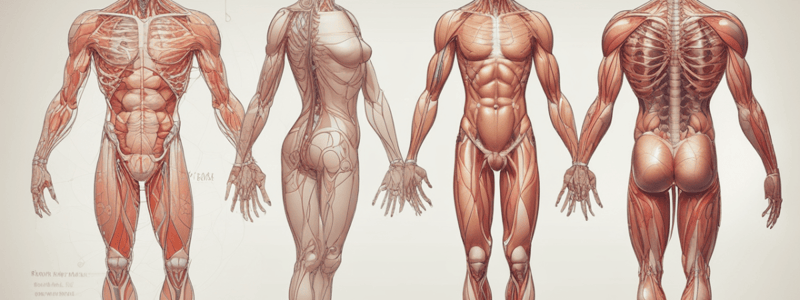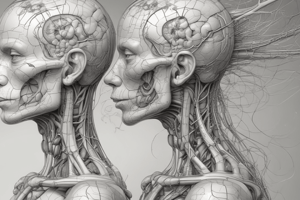Podcast
Questions and Answers
What is the approximate percentage of total body water in adults?
What is the approximate percentage of total body water in adults?
- 70-75%
- 50-60% (correct)
- 45-50%
- 60-70%
Why is the inability to concentrate urine prevalent in newborns?
Why is the inability to concentrate urine prevalent in newborns?
- Due to the greater surface area to volume ratio
- Due to the kidney being relatively undeveloped
- Due to the rudimentary LOH and counter-current exchange mechanisms
- All of the above (correct)
What is the primary function of water in the body?
What is the primary function of water in the body?
- To facilitate nerve impulses
- To act as a medium for metabolic processes (correct)
- To maintain blood pressure
- To regulate body temperature
What is the trend of total body water throughout infancy?
What is the trend of total body water throughout infancy?
What is the approximate percentage of total body water in newborns?
What is the approximate percentage of total body water in newborns?
What is the characteristic of the body fluid system?
What is the characteristic of the body fluid system?
What is the approximate amount of water lost daily through insensible water loss?
What is the approximate amount of water lost daily through insensible water loss?
How much water is needed for efficient excretion of 1000 calories?
How much water is needed for efficient excretion of 1000 calories?
What is the approximate percentage of water in newborn babies?
What is the approximate percentage of water in newborn babies?
What is the main source of water gain in the body?
What is the main source of water gain in the body?
Why does the percentage of water in the body decrease with age?
Why does the percentage of water in the body decrease with age?
Why do women have a lower percentage of water compared to men?
Why do women have a lower percentage of water compared to men?
What is the primary function of the intracellular fluid?
What is the primary function of the intracellular fluid?
Which of the following statements about the composition of intracellular fluid is true?
Which of the following statements about the composition of intracellular fluid is true?
What is the primary method for estimating total body water (TBW) in humans?
What is the primary method for estimating total body water (TBW) in humans?
What is the ideal property of an indicator substance used in the estimation of body water content?
What is the ideal property of an indicator substance used in the estimation of body water content?
What is the main function of the kidneys in maintaining body fluid composition?
What is the main function of the kidneys in maintaining body fluid composition?
What is the primary reason for the difficulty in defining the limits of various body fluid compartments?
What is the primary reason for the difficulty in defining the limits of various body fluid compartments?
What is the primary mechanism driving the transfer of fluid from the interstitial space to the vascular compartment?
What is the primary mechanism driving the transfer of fluid from the interstitial space to the vascular compartment?
What is the primary function of the ascending loop of Henle in the kidney?
What is the primary function of the ascending loop of Henle in the kidney?
What is the osmotic pressure exerted by a 1 mOsm/kg solution at 37°C?
What is the osmotic pressure exerted by a 1 mOsm/kg solution at 37°C?
What is the primary reason why the amount of fluid filtered from the circulation is curtailed?
What is the primary reason why the amount of fluid filtered from the circulation is curtailed?
What is the role of antidiuresis in determining urine concentration?
What is the role of antidiuresis in determining urine concentration?
What is the main reason why not all cells demonstrate isosmotic tonicity with the ECF?
What is the main reason why not all cells demonstrate isosmotic tonicity with the ECF?
What is the most likely cause of an isotonic fluid excess?
What is the most likely cause of an isotonic fluid excess?
Which of the following is a characteristic of hypovolemia?
Which of the following is a characteristic of hypovolemia?
What is the normal range of serum osmolality?
What is the normal range of serum osmolality?
Which of the following is a type of transcellular fluid?
Which of the following is a type of transcellular fluid?
What is the primary cause of an hypertonic ECF contraction?
What is the primary cause of an hypertonic ECF contraction?
What is the normal range of serum creatinine?
What is the normal range of serum creatinine?
Flashcards are hidden until you start studying
Study Notes
Body Fluid Composition
- Water is the major constituent of body weight, accounting for 45-75% of total body weight (TBW).
- TBW is higher in premature live births and infants, with a gradual decrease throughout infancy.
- In adults, TBW constitutes around 50% of body weight, with a higher percentage in adult females and the elderly.
Body Fluid Compartments
- The body fluid system has two major compartments: intracellular fluid (ICF) and extracellular fluid (ECF).
- ICF is separated from ECF by the plasma membrane and is mainly responsible for transporting water, electrolytes, and waste.
- ECF is further divided into interstitial fluid and plasma.
Intracellular Fluid Composition
- ICF contains small amounts of Na+ and Cl-, and almost no Ca2+.
- It contains large amounts of K+, P, and moderate amounts of Mg2+.
- ICF also contains large amounts of proteins.
Extracellular Fluid Composition
- ECF contains high amounts of Na+, Cl-, and HCO3-, and moderate amounts of K+, Mg2+, and Ca2+.
- Plasma has a higher concentration of proteins than interstitial fluid.
Estimation of Body Fluid Volume
- The indicator dilution technique is used to estimate body water content.
- The technique involves adding a known amount of indicator substance to water and measuring the concentration of the indicator.
- The volume of the water is estimated by dividing the amount of indicator added by the concentration of the indicator.
Fluid Transport and Regulation
- Blood flow delivers oxygen and nutrients to vessels, and plasma filtration across capillaries into the interstitium.
- Composition is controlled by the kidneys.
- Fluid volume is regulated by the balance between water intake and output.
Water Gains and Losses
- Daily water intake comes from ingestion (around 2100 ml/day) and the result of oxidation of carbohydrates (around 200 ml/day).
- Daily water output includes insensible water loss (around 700 ml/day) and sensible water loss (around 1600 ml/day).
- Fever increases water loss, and fluid requirements are driven by metabolic rate.
Body Fluid Balance
- The balance between water intake and output is crucial, with a daily balance of around 2500 ml/day.
- Women have a lower water percentage compared to men due to a higher percentage of body fat.
- Water percentage decreases with age due to the loss of muscle mass and increase in body fat.
Diagnostic Tests for Fluid Excess
- Urinalysis includes tests for urine pH, specific gravity, osmolarity, creatinine clearance, sodium, and potassium.
- Blood studies include serum hematocrit, blood urea nitrogen, serum creatinine, serum osmolality, serum albumin, and serum electrolytes.
Assessment of Fluid Volume Deficit
- Fluid volume deficit can be assessed by taking a history of potential factors, vital signs, body weight, skin, mucus membranes, and fluid volume deficit.
- Hypovolemia can be caused by decreased intake, vomiting, diarrhea, or fluid shift.
Assessment of Fluid Volume Excess
- Fluid volume excess can be caused by retention of water and electrolytes related to kidney disease or overload with isotonic IV fluids.
- Transcellular fluids, such as cerebrospinal fluid, peritoneal fluid, synovial fluid, and pleural fluid, are formed by secretion of epithelial cells.
Studying That Suits You
Use AI to generate personalized quizzes and flashcards to suit your learning preferences.



